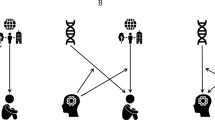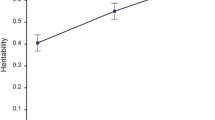Abstract
A sample of 42 like-sexed twins between the ages of 6 and 14 were diagnosed for zygosity by extensive blood typing and given theWISC and the Missouri Children's Picture Series. The importance of genetic variance for performance on theWISC subscales andMCPS personality scales was evaluated. Eleven of the scales indicated statistically reliable genetic contributions to score variance.
Previous findings on the heritability of intelligence test scores were again confirmed. Full Scale IQ heritability was estimated at .77, with Performance IQ at .82 and Verbal IQ at .48.
Within the domain of personality-relevant attributes sampled, these results provide additional support for the heritability of inhibition, social introversion-extraversion, or other-person orientation. Observed heritabilities are consistent with hypotheses of genetic contributions to score variance on activity level and aggressivity. These data raise the possibility that test measures of maturity and of masculinity-femininity show important heritabilities. The congruence of these results with reports of earlier investigatiors are discussed.
Résumé
La zygose d'un échantillon de quarante-deux jumeaux du même sexe entre les ages de six et quatorze ans a été diagnostiqué au moyen de nombreuses analyses du sang et on leur a donné le WISC et le Missouri Children's Picture Series. On a évalué l'importance de la variance génétique pour les résultats de la distribution du WISC et les échelles de la personnalité MCPS. Onze de ces échelles ont indiqué statistiquement des contributions génétiques à la variance obtenue.
Les recherches antérieures sur les tests mentaux des facteurs héréditaries ont été une fois encore corroborées. L'hérédité de l'échelle complète IQ a été estimé à .77, la Performance IQ à .82, et le Verbal IQ à .48.
Dans le domaine des attributs de la personnalité échantilloné, ces résultats fournissen un support supplémentaire pour l'hérédité de l'inhibition, de l'introversion-extraversion, ou de l'influence d'autrui. Les facteurs héréditaires observés concordent avec les hypothèses des contributions génétiques à la variance au niveau de l'activité et de l'aggressivité. Ces données suggèrent que des measures de tests de la maturité et de la masculinité-féminité pourraient montrer des facteurs héréditaires importants. On évalue la conformité de ces résultats avec les conclusions des chercheurs antérieurs.
Zusammenfassung
Eine Testgruppe von 42 gleichgeschlechtlichen Zwillingen im Alter von 6 bis 14 Jahren wurde auf Intelligenz und Zygocität diagnostiziert, und zwar mittels ausgedehnter Blutgruppenbestimmung sowie WISC und Missouri Kinderbilderserie (MCPS). Die Bedeutung der genetischen Varianz bei der Ausführung der WISC Unterskalen und MCPS Persönlichkeits-Skalen wurde ausgewertet. Elf der Skalen zeigten eine statistisch verläszlich genetische Verteilung für die Festlegung der varianz.
Frühere Untersuchungsergebnisse zur Erblichkeit von Intelligenz in Testmessungen wurden erneut bestätigt. Die volle Intelligenz-Quotient Skalar der Erblichkeit wurde auf 0,77 geschätzt, die IQ-Ausführung auf 0.82 und verbal auf 0.48.
Im Bereich der getesteten persönlichkeitsrelevanten Attribute bieten diese Ergebnisse eine weitere Zuverlässigkeit für Hypothesen von Erblichkeit von Hemmungen, sozialer Jntro-bzw. Extroversion und der Orientierung auf der anderen. Die beobachteten Erblichkeitsfaktoren stimmen mit den Hypothesen der genetischen faktoren überein, von der die Varianz auf der Aktivitätsebene und Aggression bestimmt werden. Diese Daten lassen es möglich erscheinen, dasz die Testergebnisse der Reife und Männlichkeit bzw. Weilichkeit bedeutende Erblichkeit aufweisen. Unsere Testergebnisse werden mit denen früherer Untersuchungen auf ihre Übereinstimmung hin diskutiert.
Similar content being viewed by others
References
Baker, E. A. 1970. Behavioral concomitants of an age-based psychometric maturity scale. In J. D. Pauker (Chm.), Age, sex, response communality, and behavioral descriptive categories as the bases for psychometric dimensions of children's personality. Symposium presented at the meeting of the Midwestern Psychological Association, April 1970, Cincinnati.
Erlenmeyer-Kimling, L. & Jarvik, L. F. 1963. Genetics and intelligence: a review.Science 142:1477–9.
Eysenck, H. J. 1956. The inheritance of extraversion-introversion.Acta Psychologica (Amsterdam) 12:95–110.
Freedman, D. 1965. An ethological approach to the genetical study of human behavior. InMethods and goals in human behavior genetics, ed. S. G. Vandenberg, New York: Academic Press, pp. 141–61.
Frischeisen-Köhler, I. 1933. The personal tempo and its inheritance.Character and personality 1:301–3.
Fuller, J. I., & Thompson, W. R. 1960.Behavior genetics. New York: Wiley.
Gottesman I. I. 1960. The psychogenetics of personality. Ph. D. dissertation, University of Minnesota. Ann Arbor, Michigan: University Microfilms, No. 60-3517.
Gottesman, I. I. 1966. Genetic variance in adaptive personality traits.J. child Psychol. Psychiat. 7:199–208.
Hollingshead, A. B., & Redlich, F. C. 1958.Social class and mental illness: a community study. New York: Wiley.
Holzinger, K. J. 1929. The relative effect of nature and nurture influences on twin differences.J. ed. Psych. 20:241–8.
Lopez, R. E. 1965. Hyperactivity in twins.Canadian Psychiat. Assoc. J. 10:421–6.
Newman, H. H., Freeman, F. N., & Holzinger, K. J. 1937.Twins: a study of heredity and environment. Chicago: University of Chicago Press.
Owen, D. R. 1970. Behavioral concomitants of a psychometric scale of inhibition developed from mother's reports. In: J. D. Pauker (Chm.), Age, sex, response communality, and behavioral descriptive categories as the bases for psychometric dimensions of children's personality. Symposium presented at the meeting of the Midwestern Psychological Association, April 1970, Cincinnati.
Scarr, S. 1965. The inheritance of sociability.Amer. Psychol. 20:524 (Abstract).
Scarr, S. 1966. Genetic factors in activity motivation.Child Devel. 37:663–73.
Scarr, S. 1969. Social introversion-extraversion as a heritable response.Child Devel. 40:823–32.
Sines, J. O. 1970. The use of medical and social records in the determination of the concomitants of psychometric dimensions of personality. In J. D. Pauker (Chm.), Age, sex, response communality, and behavioral descriptive categories as the bases for psychometric dimensions of children's personality. Symposium presented at the meeting of the Midwestern Psychological Association, April 1970, Cincinnati.
Sines, J. O., Pauker, J. D., & Sines, L. K. 1966. The development of an objective, non-verbal personality test for children. Paper presented at the meeting of the Midwestern Psychological Association, May 1966, Chicago.
Sines, J. O., Pauker, J D., Sines, L. K., & Owen, D. R. 1969. The identification of clinically relevant dimensions of children's behavior.J. consul. clin. Psychol. 33:728–34.
Smith, S. M., & Penrose, L. S. 1955. Monozygotic and dizygotic twin diagnosis.Ann. human Genet. 19:273–89.
Vandenberg, S. G. 1962. The hereditary abilities study: heredity components in a psycological test battery.Amer. j. human Genet. 14:220–37.
Vandenberg, S. G. 1966. Contributions of twin research to psychology.Psychol. Bull. 66:327–52.
Vandenberg, S. G. 1967. Hereditary factors in normal personality traits (as measured by inventories). InRecent advances in biological psychiatry, vol. 9, ed. J. Wortis. New York: Plenum Press, pp. 65–104.
Vandenberg, S. G., Stafford, R. E., & Brown, A. M. 1968. The Louisville twin study. InProgress in human behavior genetics, ed. S. G. Vandenberg. Baltimore: Johns Hopkins, pp. 153–204.
Wechsler, D. 1949.Wechsler Intelligence Scale for Children. New York: Psychological Corporation.
Author information
Authors and Affiliations
Additional information
This research was supported in part by Grant No. MH 13657 from the National Institute of Mental Health.
Rights and permissions
About this article
Cite this article
Owen, D.R., Sines, J.O. Heritability of personality in children. Behav Genet 1, 235–248 (1970). https://doi.org/10.1007/BF01074655
Received:
Revised:
Issue Date:
DOI: https://doi.org/10.1007/BF01074655




